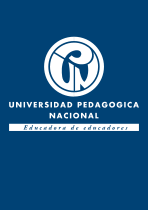La memoria y el proceso de reconstrucción personal en dos novelas colombianas.

Citación
Fecha
2017-10-12Autor
Rojas Narváez, Lina María
Enlace al recurso
https://revistas.pedagogica.edu.co/index.php/FHP/article/view/8547Metadatos
Mostrar el registro completo del ítemResumen
Este artículo pretende dar cuenta de la investigación hecha sobre la memoria en dos novelas colombianas, desde el proceso de lectura y escritura. Las novelas Flores blancas para papá, de Beatriz Helena Robledo (2012), y El gato y la madeja perdida, de Francisco Montaña (2013), son el punto de partida para entender el vínculo existente entre memoria e identidad. Para ello, y con el fin de reflexionar sobre la relación entre la construcción de los recuerdos y la lectoescritura, se relatan partes similares de cada historia, en las que las protagonistas son dos niñas que han padecido las dificultades de la guerra; una acudirá a su memoria dada la pérdida de su padre, y la otra, acudirá a la memoria para entender su nuevo contexto en relación con su padre, y también se realiza también un recorrido de los fenómenos por los que pasan las protagonistas, para sustentar la importancia de la lectura infantil de un país que ha vivido la guerra.
Abstract
This article seeks to give an account of the research done on memory in two Colombian novels, from the reading and writing process. The novels Flores blancas para papá, by Beatriz Helena Robledo (2012), and El gato y la madeja perdida, by Francisco Montaña (2013), are the starting point for understanding the link between memory and identity. To do this, and in order to reflect on the relationship between the cons-truction of memories and literacy, similar parts of each story are told, in which the protagonists are two girls who have suffered the struggles of war; one turns to her memories following the loss of her father, and the other one turns to memories to understand her new context with regard to her father. The paper also gives an overview of the phenomena that the protagonists go through, to support the importance of children’s reading in a country that has lived through the war.
Editorial
Editorial Universidad Pedagógica Nacional
